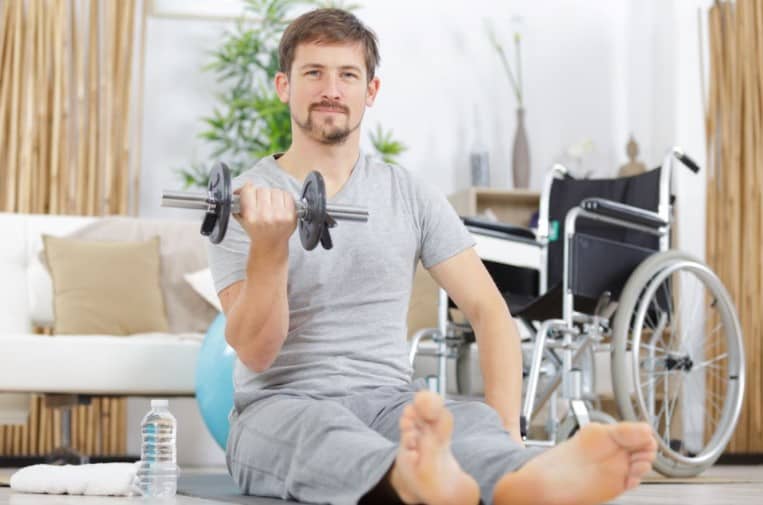Disabled or not, you want to ensure that you function at your optimum capacity and that nothing is stopping you from achieving your dreams.
Being disabled doesn’t make an individual less than those who are not, and many people with disabilities can even do more. So, it’s crucial to be at your best physical and mental wellbeing possible to conquer all obstacles that may come your way.
Exercise is essential in attaining good health and fitness, and this activity is offered in many developmental services. You can find more info about developmental services online.
Exercise improves the quality of life of people with disability in so many ways, which will be discussed below.
- Improves Musculoskeletal Structure And Functioning
One main objective of regular exercise is to improve muscle tone, mass, and strength, as well as the state of bones, ligaments, and joints. Often, non-movement or inactivity among people with disability can lead to muscle weakness, disrupting mobility
The musculoskeletal system can be compromised, resulting in poor blood flow to the stagnant extremity or affected body area. Poor blood circulation can lead to inadequate tissue perfusion, so vital organs in the body may also receive less oxygenated blood, keeping them from functioning properly.
Having a strong musculoskeletal system can help improve the quality of life of a disabled individual. They can achieve it through these methods:
- Range Of Motion (ROM) Exercise: This form of exercise aims to improve the movement of specific joints, influenced by the configuration of bone surfaces in the joint capsules, muscles, tendons, and ligaments around the joints. It’s also called passive exercise because of not exerting any effort.
- Sports Activities: Disabled people can effectively participate in various sports activities. They can participate in almost any sport that can be modified, such as basketball, bowling, canoeing, golf, fencing, rowing, rugby, sailing, skiing, ice hockey, table tennis, tennis, swimming, powerlifting, and water skiing. Also, joining such sports activities provides disabled individuals self-fulfillment.
- Boosts Immune System
Regular exercise, along with a healthy diet and enough rest and sleep, can help boost your immune system. With a strong immune system, you’ll have more time to spend with your passion, hobbies, work, and family. Also, you decrease the chances of you getting hospitalized due to infections, as well as being absent at work or important family events. All those can improve your quality of life.
Now, more than ever, everybody needs to have a stronger body to be able to combat the COVID-19 virus. This pandemic threatens disabled people, making them vulnerable. And, it’s still far from over, even though mass vaccinations have started. Make sure that you and your loved ones are protected by doing the most essential things, including regular exercise.
- Improves Self Care
Exercise is a vital aspect of self care. Make it a habit to include exercise in your daily regimen, together with grooming, relaxation, to strengthening your immune system.
Here’s how self care can improve the quality of life of disabled people:
- Self care helps alleviate stress and anxiety, providing people with disabilities with healthy coping mechanisms.
- Taking regular, relaxing baths using soothing bath products, meditating, or trying aromatherapy can help clear the mind.
- Self care reduces your risk of getting exposed to germs and viruses, including COVID-19.
- Improves Mental Health
Disabled people, especially the older ones, may experience psychological problems due to inactivity, causing loneliness. According to a study, a simple range-of-motion exercise program helps enhance stroke bedridden patients’ physical and psychological functioning. And, exercise can be a great outlet to release energy and negative feelings. When exercising, the body releases happy hormones, like serotonin, creating a more positive outlook in life.
- Improves Social Wellbeing
Everyone needs to socialize to stay physically and mentally healthy. As no man is an island, you can improve your social wellbeing by participating in different activities, including exercise.
With exercise sessions, participants don’t need to be physically present in one venue. With the advancement of technology, everybody can join in the fun through online workout sessions. You can use videoconferencing through Zoom, Skype, or other similar platforms. Through this, you get to exercise, all while gaining new friends.
Take a look at these tips to expand your social connections online:
- Join Groups: You’ll find many groups for disabled people on various social media platforms, such as Facebook, wherein you can join. Once you’re a member, you can encourage others to join you in an exercise session. Start with five- to ten-minute simple passive exercises to entice members to join
- Create Videos: You can also upload videos of your exercise sessions and gain followers on YouTube or TikTok. Create a group to interact with, or do some live streaming, teaching others how to do certain exercises.
- Start With Friends: You don’t have to limit yourself socializing with other disabled people because you can also create a group with your family and friends. Be an inspiration and role model to them by encouraging them to exercise, too. This activity can be rewarding as it gives your life a new purpose.
- Improves Your Spirituality
Aside from improving your physical, mental, and social wellbeing, you can also improve your spirituality with exercise. For instance, yoga has religious grassroots, and this exercise can help you find inner peace through controlled breathing and movements.
Your overall unique individuality and self-worth are enhanced with improved spirituality, giving you utmost joy and contentment. Exercise can help develop a more optimistic mindset about life, including strengthening one’s faith. Hence, helping people with disability, like you or your loved one, improve their quality of life.
Conclusion
Exercise can truly improve a disabled person’s quality of life in many ways. This fun physical activity helps improve your musculoskeletal system, immune system, and your overall health and fitness. Also, exercise can be a great way to socialize with family, friends, other disabled persons worldwide, and even with strangers.
You can become an inspiration to everyone and a role model for practicing a healthy lifestyle. Also, improve your psychological wellbeing and even your spirituality through exercise as it helps your body release happy hormones, thereby eliminating stress and anxiety.
So, why not make it a habit to exercise every day? It will surely bring plenty of health benefits to your life.



